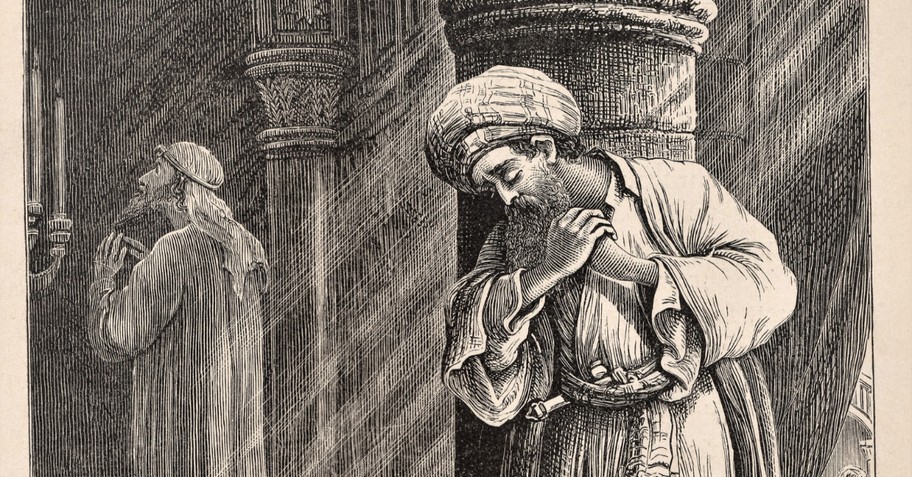What All Christians Can Learn from the Pharisees' Decline into Hypocrisy

There once was a group of devout, God-fearing individuals who loved their nation and grieved society's moral decline. They fought valiantly to defend God's Word and preserve their religious freedoms against the pagan practices that were infiltrating their culture. In an attempt to correct the societal wrongs, they took a bold stand against evil, called their brethren to repentance, and dedicated their lives to helping others obey God’s Word.
The efforts of these spiritual leaders were effective, for the most part—until they decided their followers needed extra rules and accountability to maintain Godly purity. Pride wrapped its invisible claws around the leaders’ hearts and convinced them that their Holy quest had earned them divine personal insight.
Little did the Pharisees know, the Messiah would soon come and label them, “snakes and children of Hell,” and their merciless, loveless attempts to ultra-purify the flock would instead, “shut the door of the kingdom of heaven in people’s faces.” (Matthew 23:13)
Photo Credit: Ben White/Unsplash
How Did the Pharisees Come to Be?
Shortly after the first century C.E. Maccabean revolt, Israel’s priesthood slipped into corruption. The influence of Greek culture had so permeated Judaism that it threatened to ruin everything Holy in the Jewish way of life.
Out of a desire to preserve the purity of their faith, a group of pious Jewish businessmen and synagogue leaders, called Pharisees, emerged to call God’s people back to righteousness. They believed the only way to save their people from moral corruption was by severing all ties with the pagan culture and strictly observing the 600-plus Torah laws, including additional regulations that had been taught to them through Oral Tradition. They believed that only when the Jewish people wholeheartedly turned back to God’s laws and forsook their sin, could God once again bless their nation. The word Pharisee comes from the Hebrew word meaning “separated.”
Unlike other religious sects that dominated politics and the priesthood, the Pharisees weren’t powerful or wealthy. They became the primary religious teachers in their villages because they held the esteem and respect of the common people. Cultivating a consistent, righteous standard of living among the Jewish working-class population was their ultimate goal.
Because the Temple in Jerusalem was the hub of Jewish life, the Pharisees wanted to make sure all who entered, including the sacrificial animals, were pure enough to please God. Even though the Torah contained detailed ceremonial purification instructions, the Pharisees believed they possessed divinely inspired insight that could help set a more righteous standard of living for every Jewish person who trusted their guidance.

What’s the Difference Between a Pharisee and a Sadducee?
The Pharisees and Sadducees were two sects of religious leaders during Christ’s time. Their role in Judaism was to teach the law of Moses to the people. Not only were both sects considered experts in God’s law, but both were revered for their ability to wisely interpret God’s precepts and offer practical guidance for everyday life.
The main differences between the two groups were how they interpreted the Torah and their respective attitudes about what constituted God’s law. The Pharisees believed that both the written law, given by Moses in the Torah, and Oral Tradition, passed down from Moses and the prophets, were inspired by God and profitable for instruction. Whereas the Sadducees believed in a literal interpretation of the Torah and did not consider any other source of truth as God-breathed.
Unlike the Pharisees, the Sadducees did not believe in life after death—including the existence of Heaven, Hell (Matthew 22:23). They also scoffed at the idea of a supernatural realm filled with angels and demons (Acts 23:8).
While Pharisees had great influence over the common masses and believed that worship could happen in synagogues and in everyday life outside the Temple, Sadducees were a priestly class of aristocrats whose whole existence centered around the Temple worship.
Because of their wealth, the Sadducees held strong political sway in the Roman Empire. Even though the Sadducees were considered more conservative in their religious views than their counterparts, the sect eventually adopted some of the pagan practices of Greek culture in order to maintain their elite sociopolitical status. The Pharisees banned syncretism of any kind.
After Roman legions destroyed the second temple in 70 A.D. the Sadducean sect dissipated. None of their writings survived, so what we know about the Sadducees’ pre-temple existence comes from what we learn about them from New Testament passages and other historical writings.
The Pharisees survived the destruction of the temple. and went on compile the first major written collection of Jewish Oral Tradition—the Mishnah. The Pharisee's beliefs are the foundation for today’s Rabbinic Judaism.
Photo Credit: ©GettyImages/Christine_Kohler
What Did Jesus think about the Pharisees?
The only people in scripture Jesus ever unleashed the full weight of His righteous wrath upon were those who mishandled scripture and misrepresented God. In Matthew chapter 23, Jesus exposes the folly of the Pharisees and pinpoints where they went wrong.
They abused their power and didn’t follow their own teachings: “The teachers of the law and the Pharisees sit in Moses’ seat. So you must be careful to do everything they tell you. But do not do what they do, for they do not practice what they preach. They tie up heavy, cumbersome loads and put them on other people’s shoulders, but they themselves are not willing to lift a finger to move them.” (Matthew 23:2-4)
They became people pleasers instead of God pleasers: “Everything they do is done for people to see: They make their phylacteries a wide and the tassels on their garments long; they love the place of honor at banquets and the most important seats in the synagogues; they love to be greeted with respect in the marketplaces and to be called ‘Rabbi’ by others.” (Matthew 23:5-6)
They misrepresented themselves as equal with God: “But you are not to be called ‘Rabbi,’ for you have one Teacher, and you are all brothers. And do not call anyone on earth ‘father,’ for you have one Father, and he is in heaven. Nor are you to be called instructors, for you have one Instructor, the Messiah.” (Matthew 23:8-9)
In verses 13-39, Jesus then pronounces seven “woes” upon the Pharisees and teachers of the law. The word woe used in this passage goes beyond the typical expression of grief, regret, or anger. The Greek word, ouai carries the connotation of warning that precedes judgment or impending doom. These seven woes reveal the root of the Pharisees’ sin.
Their rules and regulations had become an idol: In the seven woes, Jesus emphasizes the Pharisees’ hypocrisy six times, exposes their spiritual blindness five times, and tells them that even though they express their full allegiance to Scripture they fail to live by the spirit of the law. All their works involve meticulous attention to ritual, ceremony, and their own man-made requirements rather than the “weightier matters of the law” (Matthew 9:13; 23:23). Their rules and regulations had taken the place of God. By pursuing and promoting righteousness apart from mercy, grace, and love—the Pharisees had unwittingly dethroned the true God and replaced him with a loveless counterfeit. As a result, the Pharisees’ followers were being led down the wrong path, into spiritual darkness (Matthew 9:14; 15:1–9; 23:5; 23:16, 23; Mark 3:3-6; Luke 11:42; John 9:15-16).

What Can Today’s Christians Learn from the Pharisees?
In many of today’s conservative Christian circles, the Pharisees would likely have been labeled the ideal church member because they denounced worldliness, worked diligently in ministry, tithed regularly, and attended synagogue every time the doors were open.
Our misplaced alignment with Pharisaical standards of righteous living may be more telling than we think, and it may be a warning sign that we’re focusing too much on the external signs of faith, rather than allowing God to have His way in our hearts.
Beneath their whitewashed surface, the Pharisees had fallen into deep deception. Even worse, pride kept them from recognizing their steady spiritual decline. Most false teaching isn’t born out of a teacher’s heart to deceive—it’s the overflow of a teacher’s deceived heart.
From the fall of the Pharisees, we glean insight into our own vulnerabilities. Here are a few questions we can prayerfully consider, to check for “the yeast of Pharisees” in our own lives:
Are our beliefs rooted in God’s Word alone or heavily bound in tradition or manmade doctrine? (Mark 7:6-9) What makes you a Christian? If the answer to that question involves anything besides Jesus dying on the cross for your sins and you believing and receiving the truth of the Gospel, your faith may be as misguided as the Pharisees. “Christianity at its very heart is not a code; it’s not a cause; it’s not a creed; and it’s not a church. Christianity is Christ!”
Do we take pride in our own righteousness living? The only righteousness a Christian possesses comes from Christ. Apart from Him we can do no good thing. Because of this, when we take personal or congregational pride in our Godly obedience, scriptural knowledge, or righteous acts of service, that misplaced pride puffs us up and opens a door for the enemy to lead us into deception. “What are you so puffed up about? What do you have that God hasn’t given you? And if all you have is from God, why act as though you are so great, and as though you have accomplished something on your own?” (1 Corinthians 4:7-9, TLB)
Do we spend more time displaying the external proof of our faith and examining the external proof of others’ faith—than we do cultivating a true relationship with Christ? The Pharisees lost sight of the fact that Scripture was given by God to point us to Him, reveal His Son, and teach us His ways. God never intended the law to take the place of a personal relationship with Him, through Christ. When their long-awaited Messiah finally came, the Pharisees were too blinded by their own righteousness to recognize Jesus. Likewise, when we make ourselves the final authority on Godly living, based on our own understanding of the law—apart from an abiding relationship with the author and finisher of our faith—we miss the mark and the point. And ultimately, we miss God (Hebrews 10:19-22).
Photo Credit: ©GettyImages/WDnet
Originally published March 18, 2022.





